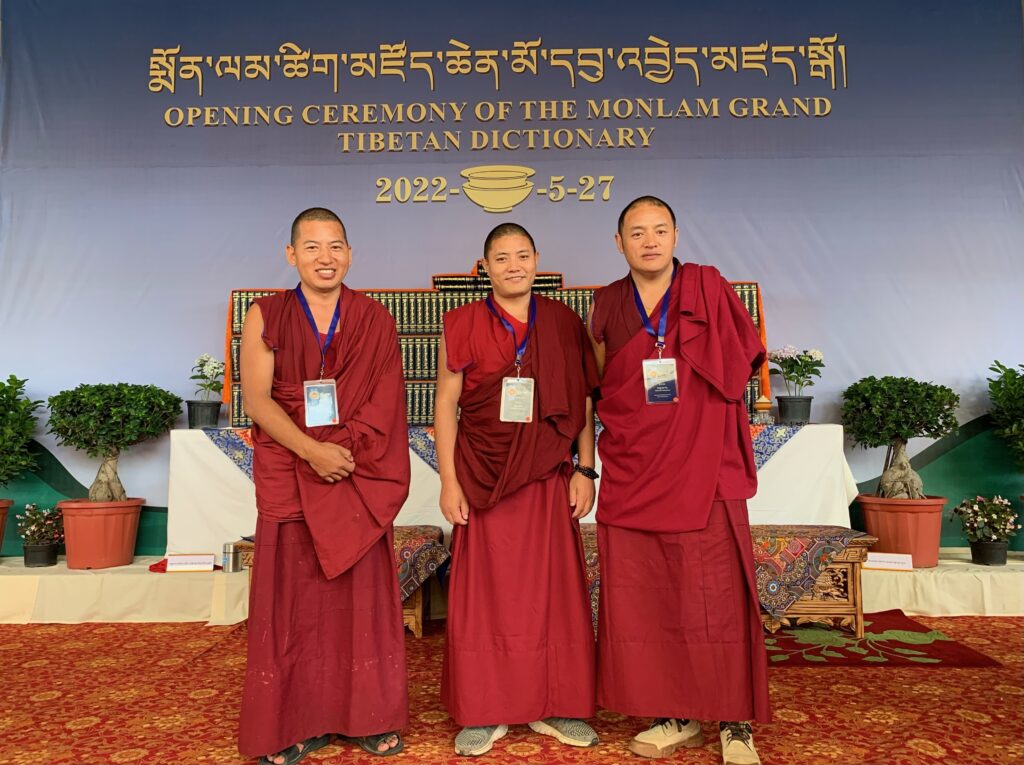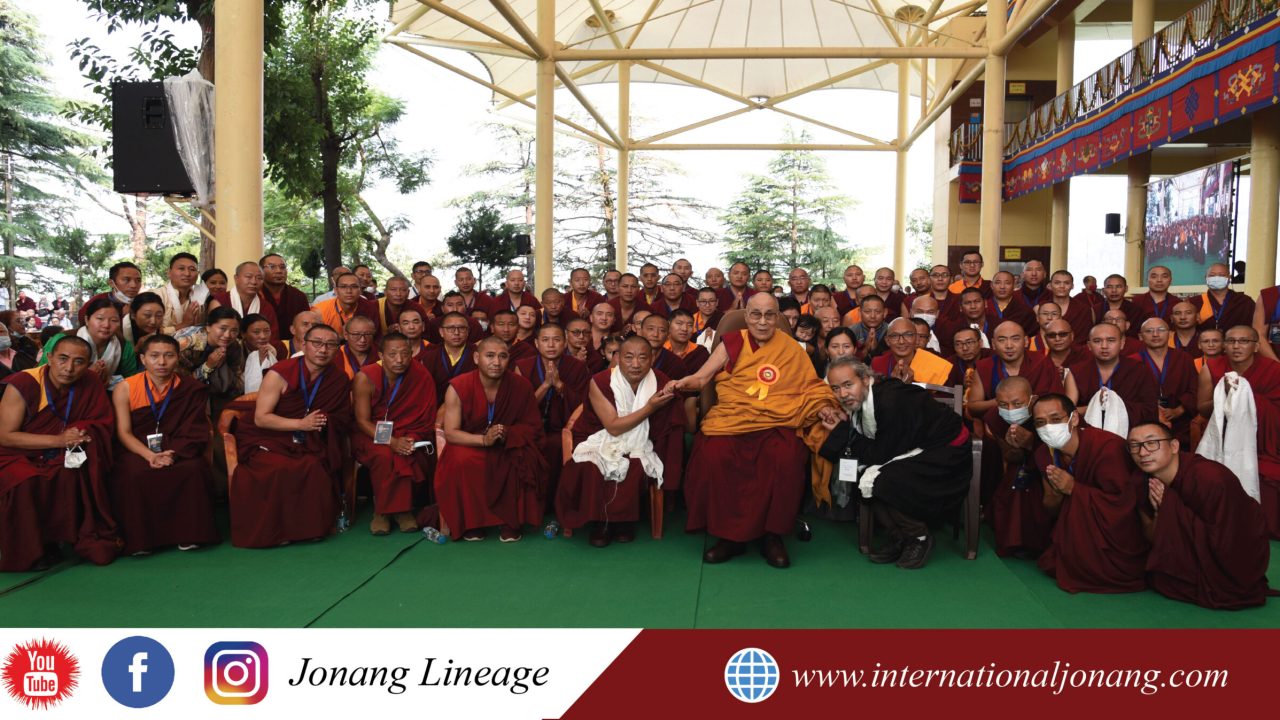Dharamshala: His Holiness the Dalai Lama today inaugurated the new Tibetan Monlam Dictionary prepared by Monlam Tibetan IT Research Center at Tsuglakhang in Mcleod Ganj. The opening ceremony of the dictionary was attended by Sakya Gongma Trichen Rinpoche, 43rd Sakya Trizin Khondung Gyana Vajra Rinpoche, 34th Menri Trizin Lungtok Dawa Dargyal Rinpoche, 42nd Sakya Trizin Ratna Vajra Rinpoche, 7th Kyabjé Yongzin Ling Rinpoche, 11th Kirti Rinpoche Lobsang Tenzin Jigme Yeshe Gyamtso Rinpoche, Ringu Tulku Rinpoche, and former Kalon Tripa Professor Samdhong Rinpoch, Dorjee Lonpon Kenga Rinchen, Khenpo Kenga Choepel and Jonang coordinators of Dictionary Project (Lhakyab, Kenga Lhndup and Kelwa as special guests.

The leadership of the Central Tibetan Administration also attended the grand opening ceremony including pro-tem Chief Justice Commissioner Karma Dadul, Speaker Khenpo Sonam Tenphel, Sikyong Penpa Tsering along with Education Kalon Changra Tharlam Dolma, Security Kalon Gyari Dolma, DIIR Kalon Norzin Dolma. Members of the 17th Tibetan Parliament and the secretaries of the various departments of the Central Tibetan Administration also took part in the ceremony.
“We Tibetans have a rich religious and cultural tradition. While we were in Tibet, we were not aware of how it compared with other traditions, but once we came into exile we became aware of how precious our heritage is. It’s a practical tradition at the core of which are methods for tackling negative emotions and cultivating peace of mind. In my own daily practice I focus on the awakening mind of bodhichitta and cultivating an understanding of emptiness, which together bring me deep inner peace. “Practitioners of other religious traditions focus on prayer, but we try to transform our mental attitudes. As Shantideva’s ‘Guide to the Bodhisattva’s Way of Life’ explains, our enemy is our best teacher when it comes to cultivating patience. If we carefully think it through, there are no adverse conditions that cannot be transformed into favourable circumstances. Understanding the workings of the mind and emotions is at the heart of the Nalanda Tradition.
“People talk about peace in the world, but if you have anger and hatred in your heart, talking about peace is simply hypocritical. What we need instead is to cultivate the longstanding Indian traditions of doing no harm (ahimsa) on the basis of compassion for others (karuna).
“Tibetan thinkers considered what to take from Chinese traditions and what to accept from India. What they found to be beneficial they assimilated. We Tibetans have faced all kinds of difficulties, but because of our practice of mind training we have maintained our inner peace. When other people encounter challenges, they resort to taking sleeping pills to get some rest—something we have no need to do.
“In exile we requested the Government of India’s help in setting up Tibetan schools where our children could study in their own language. Preserving the Tibetan language has played a key role in our ability to keep our religion and culture alive. I’d like to remind all our friends and Dharma friends gathered here that what is precious about our heritage is that it helps us achieve and maintain peace of mind.”
His Holiness was invited to address the gathering once more.
“We Tibetans have always lived between India and China, but during the reign of Songtsen Gampo we created our own written language based on an Indian model. Later, acknowledging that this gave us the means to do so, Shantarakshita encouraged Tibetans to translate Buddhist literature, including the words of the Buddha and the treatises of countless Indian scholars, into our own language. Consequently, I often tell Indian friends that you were our teachers in the past, but we may be the teachers now because we have preserved the Nalanda Tradition rooted as it is in reason and logic.
“We have techniques for dealing with anger and means to cultivate love and compassion. Practices for extending compassion to others give rise to peace of mind within individuals, which in turn has a positive effect in families and the wider community. Indeed we are today so interconnected that such methods can make a substantial contribution to peace in the world. Without peace of mind there will be no world peace.
“What’s crucial to the teaching of the Buddha is his advice not to take his teaching for granted. He insisted that his followers should examine his words and investigate his arguments in the way that a goldsmith tests the purity of gold. When we read the works of logicians like Dignaga and Dharmakirti, we find they went to great lengths accordingly to appraise and evaluate the views of others.
“Today, Chinese communist hard-liners criticize Tibetan culture without really understanding what it’s about. We may be unable to send these 223 volumes to China at present, but in Taiwan there will be people who can appreciate what kind of culture we have preserved.
“We are not seeking total independence from China, but we need to be able to keep our religion and culture alive. We shall be more than willing to share this knowledge with our Chinese brothers and sisters in the hope that doing so will promote peace between us.
“Our culture originated in India, and today we have all sorts of means to make it better known. I think there would be great benefit in combining aspects of ancient Indian knowledge with modern science. I’m looking forward to discussing how this might be done with educationists and others in Delhi. The most important element is understanding the workings of the mind and emotions, which leads to peace of mind and in the longer run to peace in the world.
“Chinese hardliners misapprehend the value of our religion and culture. Publication of this dictionary, which is already being translated into Chinese, can go some way to educating them.
“A Tibetan I know who studied in China told me that although we are currently under Chinese political control, in the long run things will change and we’ll be able help them spiritually. When Chairman Mao told me that religion is poison, it was because he didn’t know any better. There is great emotional distress in China. We can show people there how to find peace of mind.
“We woke up to the potential of our knowledge and culture when we came into exile and we have worked with courage and determination to keep them alive. I’m only one person and I’ve done what I can, but all of you gathered here can contribute to this too.” Said His Holiness the Dalai Lama.
His Holiness the Sakya Gongma Trichen Rinpoche handed over certificates to the dictionary editors following His Holiness the Dalai Lama’s speech at the ceremony. Consequently, the other special guests addressed the gathering one after another.
Given the easy accessibility of digitised copies, Sikyong remarked that soft copy would benefit in preservation of Tibetan language while urging for maximum utilisation of dictionary to the audience. Sikyong further appealed to Tibetans to put efforts into preserving and promoting Tibetan language, especially given China’s imposition of severe restrictions on learning Tibetan language in Tibet.
Before concluding his speech, Sikyong emphasised standardisation of Tibetan terms under a single central authority for benefits in the distant future, assuring provisions of necessity support from the Central Tibetan Administration and hailed the inaugural ceremony as historic.
